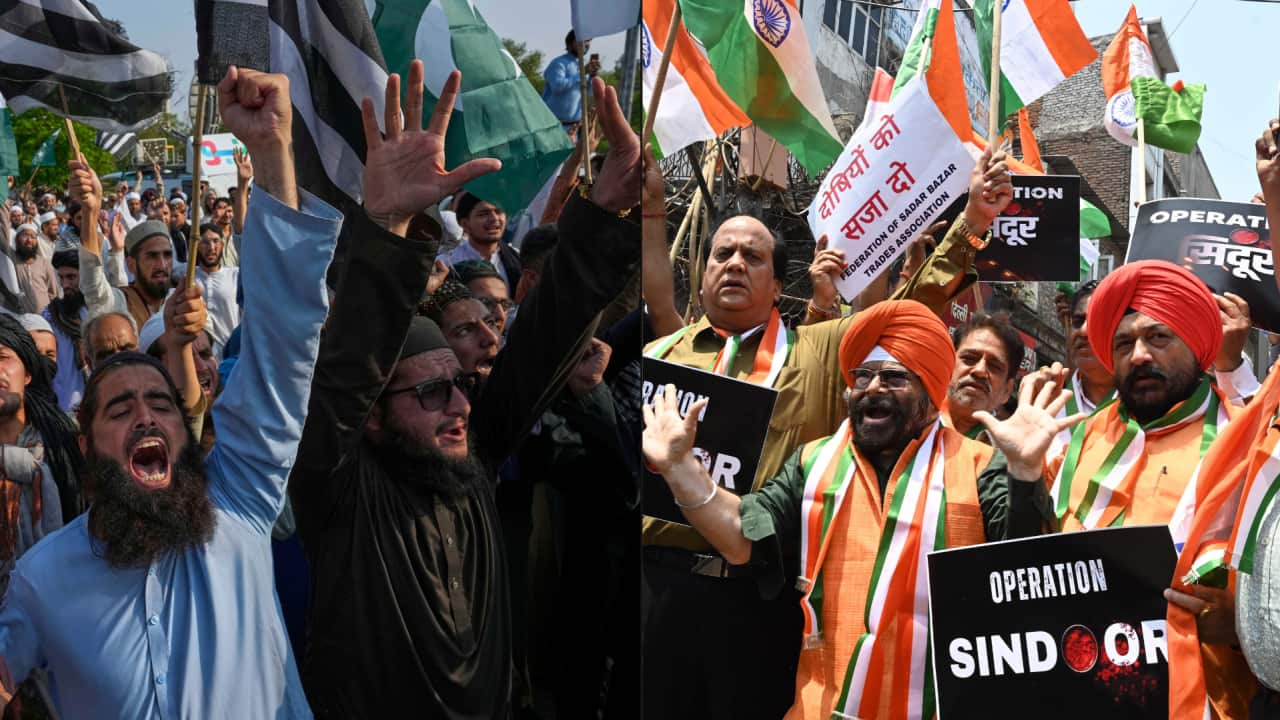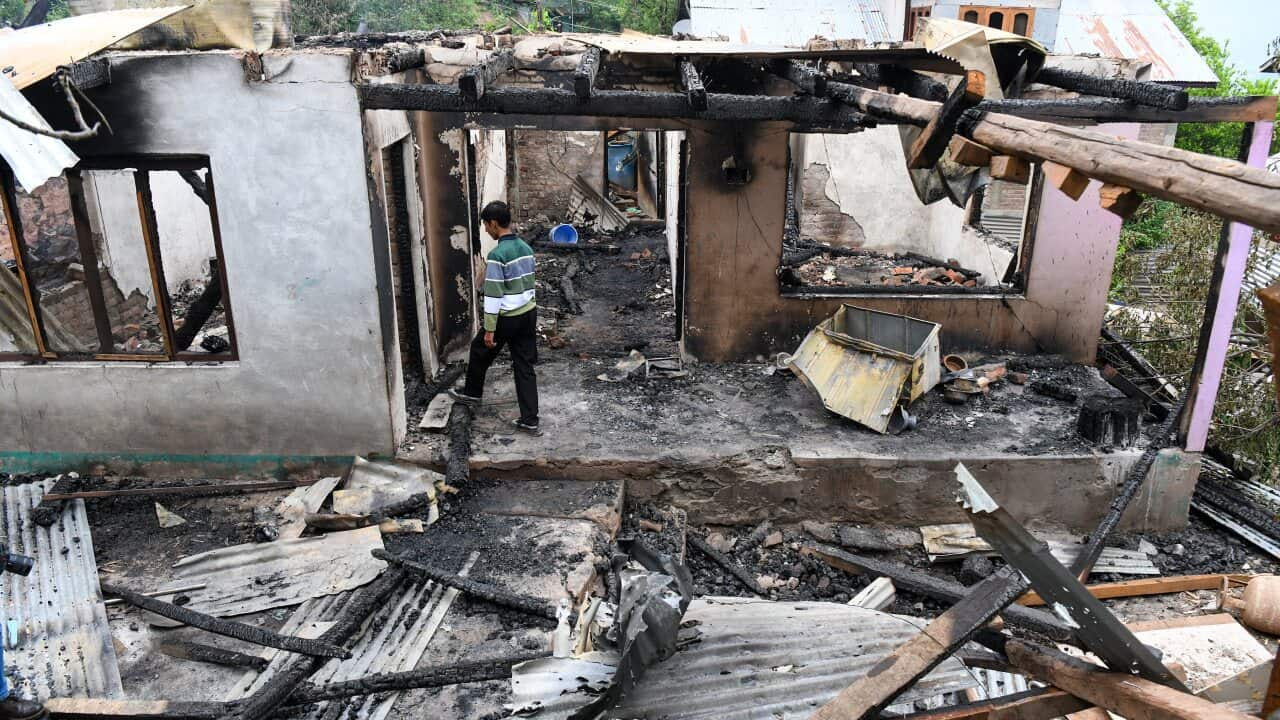Key Points
- The airspace of Pakistan has been closed to all flights for 24 hours, the country's military has said.
- Pakistan said on Saturday that it had launched retaliatory strikes against India.
- At least 50 people have been killed since Wednesday, according to casualty estimates on both sides of the border.
Pakistan's airspace will be closed to all flights for 24 hours after India launched a series of attacks on air bases, the country's military has said.
"Pakistan's airspace will remain closed for all kinds of flights until Sunday 12:00pm," a statement from Pakistan's military read.
India has also shut several airports in its northern and western regions, the Associated Press has reported.
Recent days have seen the worst fighting in nearly three decades between the two nuclear-armed South Asian neighbours.
Two loud blasts were heard in Indian-administered Kashmir's summer capital of Srinagar on Saturday, near the city airport and the local headquarters of the army, according to an official, a Reuters witness, and local residents.
Two blasts were also heard in Baramulla town, an official and residents told Reuters.
Pakistan said early on Saturday that it had targeted multiple bases in India, including a missile storage site in India's north, in response to prior attacks by the Indian military.
India said there was limited damage to equipment and personnel at four air force stations. The military said there were several high-speed missile attacks on air bases in Punjab state and that India had responded to the attacks.
Five civilians were killed in the attacks in the Jammu region of Indian-administered Kashmir, regional police said.
Pakistan said that before its offensive, India had fired missiles at three air bases, including one close to the capital, Islamabad, but Pakistani air defences intercepted most of them.
At least 13 civilians were killed in Pakistani-administered Kashmir in 12 hours until noon on Saturday, the region's disaster authority said on Saturday.
Also on Saturday, the Indian army reported fresh Pakistani attacks along the border.
"Pakistan's blatant escalation with drone strikes and other munitions continues along our western border," the army said on social media platform X.
Locked in a longstanding dispute over Kashmir, which both countries administer separate portions of, the two countries have engaged in daily clashes since Wednesday, when on what it called "terrorist infrastructure".
Pakistan vowed to retaliate.
In a message to journalists, Pakistan's military said a missile storage site in the Indian city of Beas had been "taken out", adding that the Pathankot airfield in India's western Punjab state and Udhampur Air Force Station in Indian-administered Kashmir were also hit.
Pakistan's information minister said in a post on social media site X that the military operation was named "Operation Bunyanun Marsoos".
The term is taken from the Quran and means a firm, united structure.
Pakistan's planning minister said on local television that "special measures" had been taken to avoid civilian targets and that they were targeting locations that had been used to target Pakistan.

A man inspects a room damaged by Pakistan artillery shelling in the Indian-administered Kashmir area of Uri. Source: Anadolu / Getty Images
"India through its planes launched air-to-surface missiles ... Nur Khan base, Mureed base and Shorkot base were made targets," Pakistan military spokesperson Lieutenant General Ahmed Sharif Chaudhry said in a late-night televised statement.
The chief minister of Indian-administered Kashmir, Omar Abdullah, said in a statement that a local administration official had been killed by shelling in Rajouri, near the line of control that acts as a de facto boundary in the contested region.
One of the three air bases that Pakistan said were targeted by India is in the garrison city of Rawalpindi, just outside the capital Islamabad.
The other two are in Pakistan's eastern province of Punjab, which borders India.
The Pakistani military spokesperson said only a few missiles made it past air defences, and those did not hit any "air assets", according to initial damage assessments.

People light candles during a vigil for victims of an Indian missile strike on a mosque in Muzaffarabad, the capital of Pakistani-administered Kashmir. Source: AAP / Amiruddin Mughal / EPA
Pakistan has denied India's accusations that it was involved in the tourist attack, in which 26 civilians were killed.
Since Wednesday, the two countries have exchanged cross-border fire and shelling, and sent drones and missiles into each other's airspace.
At least 50 people have been killed since Wednesday, according to casualty estimates on both sides of the border that have not been independently verified.
On Friday, Group of Seven (G7) countries urged maximum restraint from both India and Pakistan and called on them to engage in direct dialogue.
Among the G7 powers, the US has held regular talks with both India and Pakistan in recent days and urged them to de-escalate.
After a call on Friday between secretary of state Marco Rubio and Pakistan Army chief Asim Munir, the US State Department said Rubio offered US assistance "in starting constructive talks in order to avoid future conflicts".
Rubio has also held regular calls with Pakistan Prime Minister Shehbaz Sharif and Indian foreign minister Subrahmanyam Jaishankar since the end of April.
Despite growing Western calls for peace, defence experts said the opposite seemed to be happening.
"Operations moving to next level — free use of missiles and drones by both sides," Pravin Sawhney, a defence author and former Indian Army officer, told Reuters. "And reports that Pakistan Army is moving troops forward. Not good indications of what lies ahead!"




